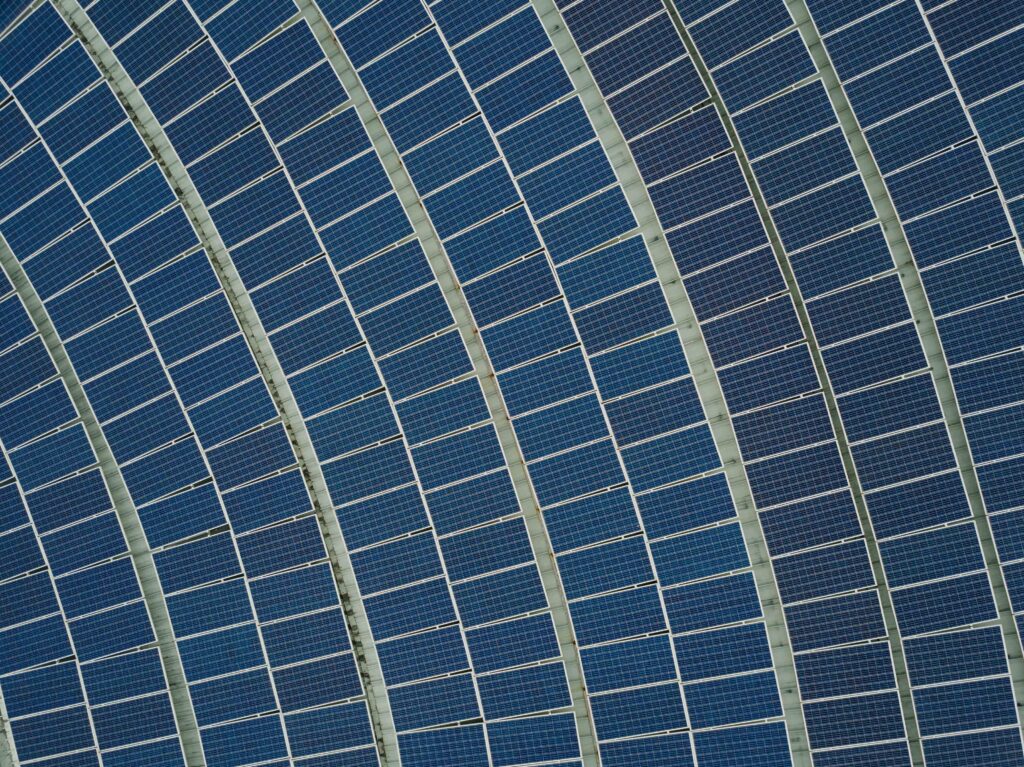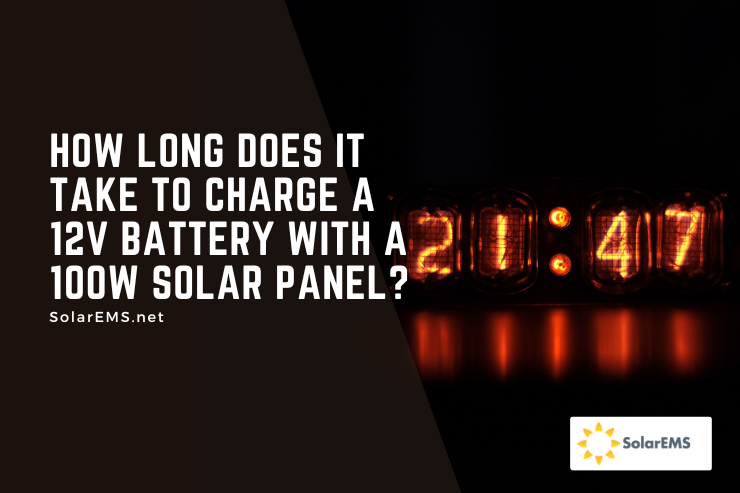A few years back, when we got solar installed on our premises, there were several questions in our mind such as how much electricity will be generated? Will there be electricity in the rain or not? How much will it cost? Is there going to be any subsidy on our purchase, and what will be the net savings? What is the on-rate system and how long to charge a 12v battery with a 100-watt solar panel? How many batteries can a 100-watt solar panel charge, what is a solar charge deep cycle battery, and how long to charge the battery with a solar panel? We had a lot of questions!
Using solar equipment was expensive and the solar batteries used in the equipment were heavy and overpriced. However, with the advancement of photovoltaic technology, solar panels have become foldable and convenient to use. In this article, we are going to learn about solar power, the usage of solar power, and how long it takes to charge a 12V battery with a 100W solar panel.
Understanding Solar Power
Solar technology has been becoming more popular over the last few years. People are using solar technology as it has become more advanced and easier to install and maintain than ever before. Also, the government is emphasizing the importance of using solar power or renewable energy as they do not emit any greenhouse gasses into the atmosphere. Many industries are innovating solar equipment which is more advanced in technology. This is the reason why solar is one of the fastest-growing energy sectors. The best part of solar energy is that it is inexhaustible and renewable.
Solar power is the energy received from the sun’s rays, which is then converted into electricity. The most commonly used solar power system is a photovoltaic (PV) system. This system is installed on a roof or other location where it can receive direct sunlight. The amount of electricity it can produce depends on the size of the system and the climate you live in. the more sunlight it receives, the more electricity it will generate. Hence, in areas where there are plentiful amounts of sunshine, solar energy can be used to power houses or office buildings.

Usage of solar power
As the world is facing climate change, energy crises, and global warming, more people are turning towards using solar power to minimize their carbon footprints. Solar energy is used for industrial as well as commercial purposes. Large-scale operations such as factories, warehouses, and farms are using solar power. It is also being used to power streetlights.
Although it is still mostly in development, solar panels can be installed on the roof of a vehicle such as cars and trucks so that they can draw sun energy and power the vehicle. This is a great way to reduce carbon emissions. Moreover, installing solar at home is beneficial for you financially as well as environmentally friendly, it can be used to power a wide range of devices, from cell phones to large industrial machines. Many homes here have installed solar panels on their rooftop due to an increase in electricity costs. Also, solar energy can be used as a primary or backup source of electricity depending on the amount of sunlight you get.
If you are planning to install solar panels on your roof, you need to keep in mind the direction you are installing it in, and it’s angle because that is greatly going to affect the efficiency of the solar panels.
Factors affecting charging time
- Chemical Structure: The type of battery or its chemical structure will affect how fast it charges. For example, Tesla’s Powerwall batteries are composed of different types of lithium-ion cells which makes them different from lead-acid batteries or wet cells. Therefore, different types of batteries may have different charging speeds. Also, you need to keep in mind that the price is determined by the chemical structure and battery capacity.
- Type of PV Panel: The type of PV panel can also affect the charging time. High-capacity panels will charge the battery faster. In case you are using an older panel, it may take more time. However, it is recommended to use new panels as they are more effective and productive than older panels.
- Battery Location: The location of the battery can also affect the charging speed. A battery close to where you need it is considered a good idea. However, the temperature is also a key factor in charging speed. For instance, if the location is too cold or too hot, the charge rate slows down.
- Battery Temperature: Battery temperature plays a key role in charge time. If the temperature is too cold or too hot, the charge rate slows down.
- Battery Age: As the battery ages, it is more likely to suffer from degradation, which can affect the charging speed. Also, newer batteries often have technology built-in to charge faster.
- Battery Size: A larger battery will take longer to charge than a smaller battery. The size also plays a role in how fast it will charge. The more surface area, the faster it will charge.
- Charging Rate: The charging rate can also affect the charging speed. A faster charging rate will charge the battery faster. However, it is important to note that a faster charging rate can also hurt the battery’s lifespan and capacity.
How Long Does It Take To Charge a 12V Battery With a 100-Watt Solar Panel?
The amount of time it takes to charge a 12V battery with a 100-watt solar panel depends on the capacity of the battery. The capacity of a battery is measured in amp-hours (Ah) or watt-hours (Wh), which tells you how much electrical energy the battery can store. To convert amp-hours to watt-hours, you need to multiply the amp-hours by the voltage of the battery, which is 12V for a 12V battery.
For example, if you have a 50Ah 12V battery, the capacity of this battery is 50 Ah x 12V = 600 Wh. This means that the battery can store 600 watt-hours of electrical energy.
A 100-watt solar panel generates energy based on the amount of sunlight it receives. On average, a 100-watt solar panel will generate around 31.25 watt-hours of energy per hour. To calculate how long it will take to charge a battery with a 100-watt solar panel, you need to divide the capacity of the battery (in watt-hours) by the amount of energy the solar panel generates per hour.
For example, to charge the 50Ah 12V battery mentioned earlier, you would divide 600 Wh by 31.25 Wh/hr, resulting in a charging time of 19.2 hours. To charge a 120Ah 12V battery, you would divide 1440 Wh by 31.25 Wh/hr, resulting in a charging time of 46.08 hours.
However, it is important to note that the charging time will also depend on the current state of charge of the battery, and the actual amount of sunlight the solar panel receives. The time calculated is an estimation and actual time may vary.
How do you charge batteries with solar panels?
- The first step is to find a suitable solar panel. Generally, a larger panel will be able to provide more energy than a smaller one, so it’s important to find the right size panel for your needs.
- Once you’ve found a solar panel that is suitable for your needs, you’ll need to connect it to your deep-cycle battery. This connection can be made through a charge controller, which is responsible for regulating the amount of power that is provided to the battery. It’s important to ensure that the charge controller is properly wired to the battery, as incorrect wiring could potentially damage the battery.
- Once the connection is made, your solar panel will begin to charge your deep-cycle battery. The amount of time it takes for the battery to be fully charged will depend on the size of the battery, as well as the amount of energy provided by the solar panel. Generally, a deep cycle battery can be charged in a matter of hours, and in some cases, it may take up to a day or two for a full charge.
Conclusion
Charging deep-cycle batteries with solar panels can be a great way to reduce your carbon footprint and save money on electricity bills. However, it’s important to do your research to determine if solar panels are the right choice for your needs, as well as factor in the cost of maintenance when considering your budget. With the right knowledge and tools, you can easily use solar panels to charge your deep cycle battery and reap the many benefits of renewable energy.
Frequently Asked Questions
How long to charge a 12v battery with a solar panel?
It depends on various factors such as the size of the battery, the amount of direct sunlight, and the efficiency of the solar panel. Generally, it can take anywhere from 5-8 hours to fully charge a 12V battery with a 100W solar panel.
What type of charge controller do I need to use with a 100w solar panel?
A charge controller is required to regulate the flow of current from the solar panel to the battery. The type of charge controller needed will depend on the size and voltage of the battery and the type of solar panel being used. Most 12v batteries are best charged with a 10 amp PWM (pulse width modulation) charge controller.
How do I know if my 12v battery is fully charged?
You can analyze if your battery is fully charged by measuring the voltage using a Voltmeter. A 12v battery is considered fully charged when the voltage reads 12.6v or higher.
What happens if I leave my 12v battery plugged into the solar panel for too long?
If your battery is left plugged into the solar panel for too long, it may become overcharged and damaged. This could result in a shorter lifespan for the battery. So make sure to unplug your battery when it is fully charged.
How many batteries can a 100-watt solar panel charge?
It is determined by the orientation or angle of the installation of the solar panel and its location. However, it is advised to use lithium-ion batteries.
This article provides insights into what solar energy is, the usage of solar power, and its importance. We have also mentioned how to calculate the time required to charge a 12v battery using a 100-watt solar panel, and the factors that can affect the time taken.
Meet the Authors
Dax Linwood is a knowledgeable and experienced writer in the field of renewable energy, with a core expertise in solar energy. With a passion for sustainability and a commitment to advancing the adoption of clean energy, Dax's writing is both informative and engaging. He has worked on numerous solar energy projects, including solar panel installation and maintenance, and has a deep understanding of the technology and its benefits. Dax's expertise and dedication to the renewable energy industry make him a valuable resource for those looking to learn more about solar energy and its impact on the environment.

